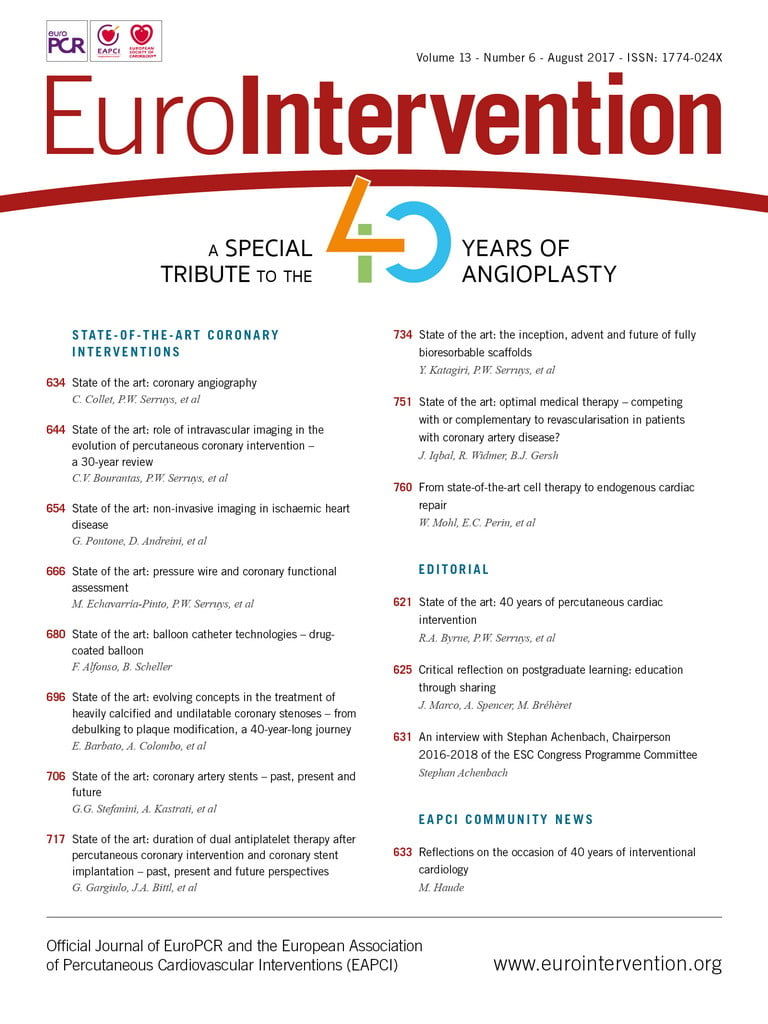
Introduction
With our special emphasis on the 40th anniversary of the pioneering work of Andreas Grüntzig et al, EuroIntervention spoke to Professor Achenbach, Chairman 2016-2018 of the European Society of Cardiology (ESC) Congress Programme Committee, on his own reflections about this important celebration and the unique focus this year in Barcelona.
If you had to highlight one milestone in the history of interventional cardiology, which one would you choose and why?
I would say that there are really two milestones. The first coronary angiograms by Mason Sones, which provided the ability actually to visualise the coronary arteries for diagnostic purposes and the second, obviously, the first transcatheter treatment of coronary stenosis by Andreas Grüntzig in 1977.
Which one of the pioneers of our specialty has most influenced your practice and why?
Again, Grüntzig, because I spend most of my time working as a doctor in the cathlab treating coronary disease. After him, I would probably say Ferdinand Kiemeneij, because most of what I do uses the transradial approach.
This year the ESC Congress and the EAPCI are celebrating 40 years of PCI: what’s not to be missed in Barcelona?
At the ESC Congress 2017 there is a particularly rich programme for the interventionalist. There are new guidelines on valvular heart disease, peripheral vascular disease, STEMI treatment and dual antiplatelet therapy which will be featured in dedicated sessions. There is the “Spotlight stage”, for which a fantastic faculty has been recruited, with “live in the box” sessions that highlight numerous cardiac interventions from primary PCI to transcatheter mitral valve repair. There are several sessions highlighting late-breaking science and many other sessions pertinent to cardiac interventions, such as the “TAVI/TAVR Summit”. The creme de la creme of interventional cardiology will be on the ESC Congress 2017 faculty, providing fantastic opportunities for participants to learn from and interact with the best.
Let me also mention two special sessions: an interactive session called “Let´s Discuss Strategy”, in which leading interventionalists from around the world will discuss their approach to treating coronary lesions in a wide spectrum of cases from easy to very complex, and a specific session to honour the achievements and memory of Andreas Grüntzig.
What does it mean for you personally to celebrate the 40 years of angioplasty/PCI this year?
Three things: first, that I continue to be amazed how this method has changed and influenced the treatment of patients with coronary artery disease. Second, that I am acutely aware of the seemingly unstoppable progress being made in this field and that we should expect continuous growth in areas of which we currently cannot even conceive (similar to what happened 15 or 20 years ago when most specialists would have considered percutaneous treatment of aortic valve stenosis unlikely). Third, importantly, we must continuously be vigilant, always to be clear as to which patients and in which disease settings our interventions are really meaningful and beneficial – “just because it looks bad” does not mean it needs to be “fixed”.
What are the challenges facing interventional cardiology today?
Identifying more precisely the patients who will benefit from our interventions, which is the direction FFR is pointing to in coronary artery disease (even though more work remains to be done). Assuring an adequate level of quality and competence, especially for those interventions performed less frequently, and making the technically achievable also economically feasible.
What unmet needs remain to be answered or what advances need to occur in the next 40 years of our specialty?
In interventional cardiology in the short to medium term: a good percutaneous solution for mitral and tricuspid valve disease. In cardiology in general: if we could prevent coronary artery disease, hypertension and diabetes, many downstream problems would go away (as would the field of interventional cardiology, to a relevant extent). For the former, a “vaccination” that ensures low cholesterol levels and minimises inflammation may someday become a possibility. For the latter –eliminating hypertension and diabetes– however, I am less optimistic. An active lifestyle will become even less of a norm in the future than it currently is.
Conflict of interest statement
S. Achenbach has received research grants (to institution) from St. Jude Medical.

